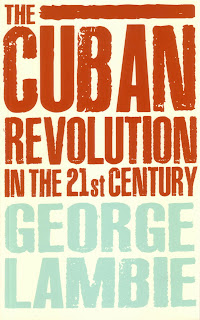This is a monumental work describing how the destiny of the Cuban revolution is now inextricably linked to the mounting world resistance to neoliberal globalisation. Over five chapters George Lambie covers in detail (there are over 30 pages of references) the background to globalisation, western liberal democracy, the Cuban revolution, its beginnings, crises and future. To understand why Cuba can survive he delves into the ideological formation of capitalism to reveal its weaknesses and contradictions.
He brings extensive personal research and experiences of working with Cuba to explain why international solidarity has never been more important for the island. Cuba’s achievements and commitment to socialism has already been ‘absolved by history’ but it is up to all of us to use the current global financial crisis to propel Cuba’s example to a higher level. This book is an enormous help.
Cuba’s fate was predetermined by the course of history or so the argument goes. This book challenges that idea head on and asks instead can the neoliberal global order survive? By looking at Cuba, not in isolation from the world, it questions how its ‘unity of purpose’ can continue to influence and be absorbed into the growing popular resistance movements emerging within the core of ‘globalisation’. Cuba’s revolution is not a socialist anomaly in a capitalist world, a perception which only invites detailed studies of the islands internal dynamics, but he argues, is an important example of counter hegemony in a failing international system.
Through popular participation and social interaction Cubans of all ages, but especially the young, must continue to shape revolutionary priorities, be determined to manage the economy for the social good and contain and resist those influences that are diluting the Revolution.
By charting Cuba’s social achievements, its participatory democracy, its revolutionary pedigree and its international dignity he identifies how this example can integrate into a wider world movement, reviving its legitimacy and relevance in the struggle against a transnational conflict that will do nothing less than decide the fate of humanity.
Reviewed by Bob Oram
Published by Pluto Press.


No comments:
Post a Comment